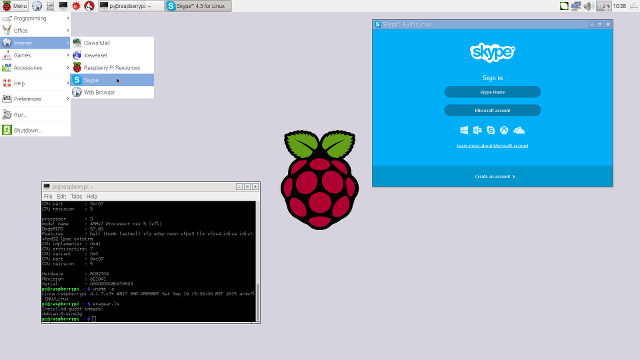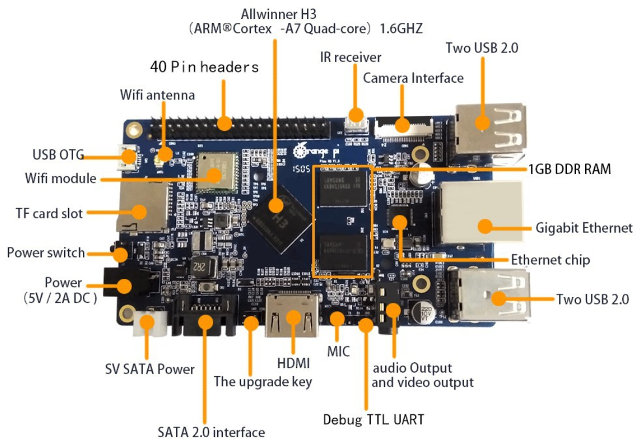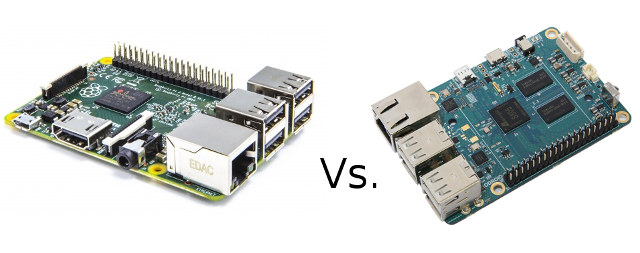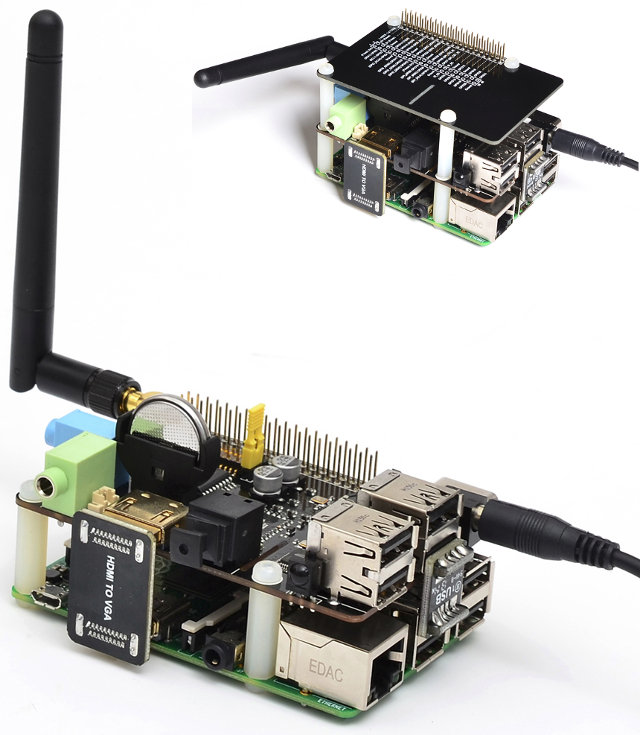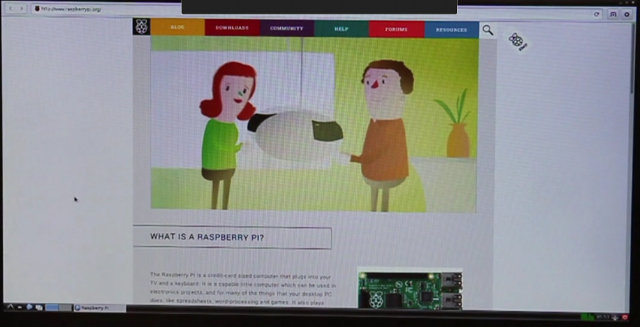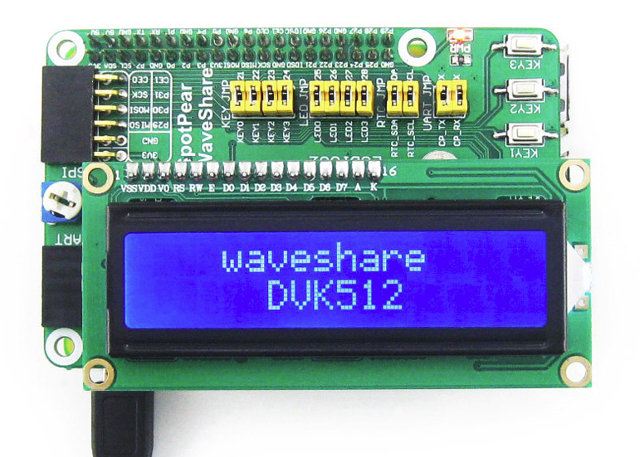A few weeks ago, I finally decided to buy a Raspberry Pi 2 board as it could always be useful for some testing, at least for comparison purposes. I ended up buying it from Ebay for $40, as it’s $3 to $5 more expensive locally. Nevertheless, I was not sure what I’ll use it first for, but after seeing a tweet for Exagear Desktop software that allows ARM boards to run x86 Linux or Windows applications, the latter through wine. The program is available for Raspberry Pi, Raspberry Pi 2, and ARMv7 devices for $19.95 to $29.95. I asked for a version for testing purposes, and I was given a Google Drive link to download Exagear for Raspberry Pi 2, as well as a 3-month trial key. Installation is very easy. I started by downloading and installing Raspbian Jessie the usual way on a 32GB micro SD card. It went […]
Orange Pi Plus (Allwinner H3) Firmware Images and Linux SDK Released
Orange Pi Plus is a development board based on the new Allwinner H3 quad core Cortex A7 processor that supports 4K video output and decoding. The boards comes with 1GB RAM, 8GB eMMC, HDMI output, Gigabit Ethernet, Wi-Fi, SATA and more, and sells for $49 on Aliexpress. When I first covered the board in February, it was already listed on Aliexpress, but I could not find any firmware image, or source code, but this has now changed. There are now four firmware files: Lubuntu_1404_For_OrangePiplus_v0_8_0_.img.xz – Lubuntu 14.04 image Raspbian_For_OrangePiplus_v0_8_0.img.xz – Raspbian for Allwinner H3 orangepi-plus-debian-server-card-v0.9.img.xz – A Debian server image sun8iw7p1_android_orangepi-plus_uart0.rar – Android 4.4.2 image that needs to be flash with PhoenixCard in Windows (Linux tools are not working yet) Beside the firmware images, the company also releases a Linux SDK (h3-lichee-1.0.tar.gz) with Linux 3.4 kernel source code, u-boot, and relevant tools. I assume these should also work on Orange […]
Raspbian Image with Docker 1.5.0 Released for Raspberry Pi Boards
I’ve read quite a few articles mentioning Docker recently, but never really looked into it. So what is Docker? The developers describe it as: Docker is an open platform for developers and sysadmins to build, ship, and run distributed applications. Consisting of Docker Engine, a portable, lightweight runtime and packaging tool, and Docker Hub, a cloud service for sharing applications and automating workflows, Docker enables apps to be quickly assembled from components and eliminates the friction between development, QA, and production environments. As a result, IT can ship faster and run the same app, unchanged, on laptops, data center VMs, and any cloud. In practice, it looks like a lightweight virtualization solution that facilitates apps distribution to different operating systems and hardware platforms. For example, if your development machine is running Ubuntu 14.04 and you’ve developed an app requiring Python 3.0, Docker should make it a breeze to it on […]
Raspberry Pi 2 / ODROID C1+ Development Boards Comparison
Raspberry Pi 2 Model B board has just been released, and although it’s not a direct answer to ODROID-C1, as Broadcom started the design for BCM2836 SoC for RPI2 a long time ago, both low cost development boards have similar specifications, with a quad core processor, 1GB RAM, Ethernet, and four USB ports, as well as the exact same price: $35. So I’ve decided to compare both in details to find out the actual differences, and which one may be more suitable to a particular application. Let’s get straight to the comparison table. [Updated on November 24 to use ODROID C1+ instead of ODROID C1] Hardkernel ODROID C1+ Raspberry Pi 2 Model B Comment Processor Amlogic S805 quad core Cortex A5 @ 1.5 GHz (Overclockable to 1.7 GHz or more) Broadcom BCM2836 quad core Cortex A7 @ 900 MHz (Overclockable to 1.1GHz or more) Despite the architecture advantage for Cortex […]
Suptronics X200 Raspberry Pi Model B+ Expansion Board Adds Wi-Fi, RTC, VGA, optical S/PDIF, USB ports, Servo Support, and More
The Raspberry Pi is a nice little board, but in some cases you may want to add some extra ports. Suptronics released the X100 expansion board for Raspberry Pi Model B last year, and they’ve now come up with a little monster called X200 expansion board for Raspberry Pi Model B+ which adds Wi-Fi, a real-time clock + battery, a VGA port, optical S/PDIF output, 3.5 mm mic and audio jack, servo support (ULN2803), and a few USB ports to the low cost board. Key features of X200 expansion board: Input Voltage – 6V to 21Vdc converted to 5V, 3A via step-down DC/DC converter to power the Raspberry Pi. VGA output – HDMI to VGA converter supporting up to UXGA (1600×1200) and 1080p with 10-bit DAC Audio – 3.5mm MIC in jack, 3.5mm stereo audio jack, S/PDIF output, audio I/O connector (Microphone input and stereo audio amplifier 3.3Wx2) Connectivity – […]
Banana Pro Allwinner A20 Development Board Looks Similar to Raspberry Pi Model B+
Banana Pi development board was launched about half year ago with Raspberry Pi model B form factor, but with more powerful Allwinner A20 dual core processor, and extra interfaces such as SATA. A few months later, the Raspberry Pi foundation launched Raspberry Pi Model B+ with pretty much the same specifications, but a different board layout and connector placement, and LeMaker has now designed a new version of the AllWinner A20 development board called “Banana Pro” that’s somewhat similar to R-Pi B+ board layout, with a 40-pin header, and similar connector placement, minus a few differences, such as using two USB ports instead of four, and the addition of a Wi-Fi module. Banana Pro specifications with differences against Banana Pi highlighted in bold: SoC- Allwinner A20 dual core Cortex A7 processor @ 1 GHz with Mali-400MP2 GPU System Memory – 1 GB DDR3 Storage – micro SD card slot, SATA […]
New Optimized Web Browser Released for the Raspberry Pi
If you’ve ever tried to use a Raspberry Pi to browse the web, you must have noticed how frustrating it can be due to the overall sluggishness of the system. But thanks to work by Collaborra, which optimized Epiphany Web browser for the Raspberry Pi, bringing features such as 720p HTML5 hardware video decoding (no flash support), faster loading and scrolling, etc.., the web browsing experience has much improved, although as you’ll see from the video below, it’s still not quite 100% perfect. The key modifications brought to Epiphany Web browser are listed below: More responsive UI and scrolling, even while loading a page Progressive tiled rendering for smoother scrolling Startup is three times faster Avoid useless image format conversions Better YouTube support, including on-demand load of embedded YouTube videos to make page load much faster Hardware decoding and scaling of videos (through gst-omx) Reduction of the number of memory […]
Waveshare DVK512 Kits For Raspberry Pi Model B+ Include RTC, Sensors, LCD Display, and More
Beaglebone (Black) expansion boards are called capes, Minnowboard ones are lures, and Raspberry Pi model B+ add-on boards can be HATs (HArdware on Top). When I found a kit for the Raspberry Pi model B+ on DealExtreme, based on Waveshare DVK512 add-ons board I thought it might have found a Chinese HAT, but unfortunately it is not compliant with HAT board specifications as it misses an EEPROM,and the dimensions are not the correct one either. Nevertheless, the kit, as well as extra accessories such as a 3.2″ LCD display, can still be interesting. The kit on DX comes with the following items: DVK512 expansion board that connects to the 40-pin Raspberry Pi B+ header and features PCF8563 RTC chip with battery, an on-board USB to TTL chip for debugging via micro USB, a character LCD interface, connectors for modules connected via UART, SPIO, I2C or GPIO, various jumpers and user […]


